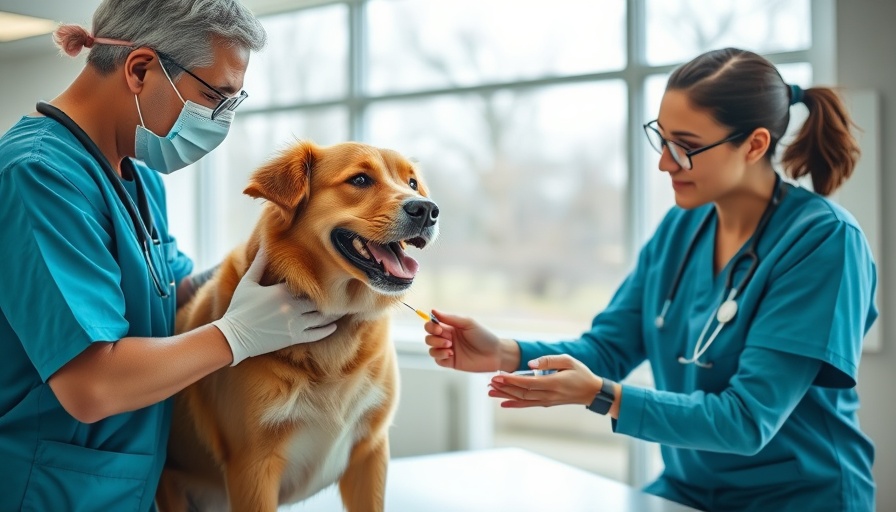
Understanding the Essential Canine Vaccine Schedule
As pet parents, ensuring that our furry friends remain healthy and protected against diseases is a top priority. One of the most fundamental aspects of puppy wellness is keeping up with vaccinations. However, determining how often dogs really need vaccines can be complex. The vaccine schedule isn't merely a checklist; it varies widely based on factors like age, breed, lifestyle, health, and even local laws. Collaborative decision-making with a veterinarian is not only beneficial but vital.
The Puppy Vaccine Timeline: Early Protection for Lifelong Health
Puppies typically receive their first vaccines within the initial four months of their lives, kicking off with critical shots like Distemper, Adenovirus, and Parvovirus, often administered in combinations (referred to as DHLPP). Typically, the first round occurs around 10-12 weeks, with a subsequent dose at approximately 16 weeks. Additionally, some vaccines, such as Bordetella and Lyme, may be recommended depending on the puppy’s exposure risks. These early immunizations provide a necessary defense against diseases that can seriously compromise a dog's health.
Adult Dogs: Keeping the Protection Going Strong
As dogs transition into adulthood, their vaccination needs evolve. Core vaccines, such as Rabies and the DAP combination, should be administered every three years if the vet uses the three-year vaccine. Every year, it’s also advisable for dogs to receive vaccinations for Leptospirosis, Bordetella, and Canine Influenza, depending on their lifestyle and risk factors. For example, if your dog frequents grooming salons or dog parks, the Bordetella vaccine may need to be given annually or even bi-annually. This awareness of exposure can help your furry friend stay safe in environments where pathogens could pose a threat.
Why Vaccination Matters: Healthy Pets, Happy Lives
The importance of staying current on vaccinations cannot be overstated. Vaccines not only safeguard individual dogs but also contribute to community protection by minimizing disease outbreaks. An unvaccinated pet could put others at risk, particularly in communal settings such as dog parks or boarding facilities. Engaging pet owners in discussions about vaccination details benefits not only the individual pet but the community at large.
Identifying Core vs. Lifestyle Vaccines: What’s Right for Your Dog?
Core vaccines are crucial for all dogs and include Rabies, DAP, and Leptospira, often mandated by law. However, lifestyle vaccines may not be necessary for all dogs. It’s essential to have an open conversation with veterinarians, who can provide insights tailored to your dog’s specific needs. For instance, if your dog has a less active lifestyle, certain optional vaccines may be on a less frequent schedule, connecting individualized care to vaccine strategy.
The Vet’s Role: Why You Should Consult Professionals
Veterinarians provide first-rate guidance when it comes to determining a dog’s vaccination needs. They consider a range of factors - from lifestyle and age to prevailing diseases in your area - and establish an appropriate immunization schedule. Regular check-ups foster a healthy, proactive approach to pet care, ensuring vaccines are well-timed and comprehensive.
Common Misconceptions About Dog Vaccinations
Many dog owners hold misconceptions about vaccination. One prevalent myth is that once a dog is vaccinated, protection is lifelong. This isn’t always true; many vaccines require boosters or can lose efficacy over time. Educating clients about the importance of keeping up with vaccines, despite age, helps build a culture of health awareness among pet owners.
Future Considerations: Adapting to Changes in Veterinary Care
As veterinary science evolves, vaccination protocols may also shift. Advancements in research may lead to the development of more effective vaccines or entirely new vaccination guidelines. Pet parents should remain informed, continuously learning alongside their veterinarians. This openness will empower caretakers to adapt to best practices to ensure their pets receive optimal health care.
Concluding Thoughts: Empowering Pet Parents Through Education
Understanding canine vaccinations is crucial in fostering healthier living for our pets. As guardians, staying informed empowers us to make decisions that support our dog’s well-being throughout their lives. Regularly consult with your veterinarian, share experiences with other pet owners, and embrace the information with open arms. The health of our furry companions depends on it!
Reflecting on this information can enhance your role in supporting pet wellness. Connect with your veterinarian about vaccination schedules and practices. With so many resources available, it's essential to understand what’s right for each unique pet. Don't hesitate to reach out to professionals and fellow pet parents — together, we can cultivate a healthier community for all.
 Add Row
Add Row  Add
Add 




 Add Row
Add Row  Add
Add 


Write A Comment